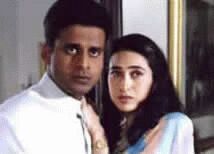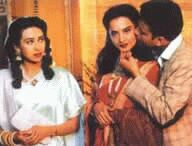|


Released on: January 19, 2001
Approximate Running Time: 2hrs. 30 minutes
Producer: Farouq R Rattonsey
Director: Shyam Benegal
Starring: Rekha, Manoj Bajpai, Karisma Kapoor
Music: A.R. Rahman
Lyrics: Javed Akhtar
Released on: January 19, 2001
Approximate Running Time: 2hrs. 30 minutes
Reviewed by : Bilal Hussain
Reviewer's Rating: 9.0 out of 10
 After
"Fiza", the semi-autobiographical story of Khalid Mohammed,
the writer presents his new offering - the tale of his mother -
"Zubeidaa". This would definitely qualify as one of those
many instances where truth is even stranger than fiction. The story
of the actress who marries into royalty and dies rather prematurely
is still shrouded in mystery, and though Mr. Mohammed does not attempt
to shed light on the cause of her demise, he elucidates the circumstances
surrounding the tragedy - leaving the audience to ponder over a
life gone wrong. After
"Fiza", the semi-autobiographical story of Khalid Mohammed,
the writer presents his new offering - the tale of his mother -
"Zubeidaa". This would definitely qualify as one of those
many instances where truth is even stranger than fiction. The story
of the actress who marries into royalty and dies rather prematurely
is still shrouded in mystery, and though Mr. Mohammed does not attempt
to shed light on the cause of her demise, he elucidates the circumstances
surrounding the tragedy - leaving the audience to ponder over a
life gone wrong.
The film tells the story of a film journalist's search for the
truth that is his mother. Zubeidaa (Karisma Kapoor) is born into
a Muslim film family that looks down upon their daughter as an actress.
Her father (Amrish Puri) can have an affair with a leading actress
of the studio, but he strongly objects when he catches his daughter
doing a banjaran dance number for the man that buys the studio from
him. Zubeidaa is then forced into a premature marriage with her
father's best friend's son. She quickly becomes pregnant, and even
as she delivers - a family feud erupts and her father decides that
she must get divorced.
Zubeidaa survives this trauma by finding solace in Rose, her father's
socialite/actress mistress. Rose takes Zubeidaa to a polo match
where the young lady meets the royal prince - Victor (Manoj Bajpai).
A romance quickly blossoms and Zubeidaa is forced to leave her child
behind with her mother (Surekha Sikri) and move to a world of supposed
freedom and royalty.
After marrying Victor, Zubeidaa meets Mandakini (Rekha), Victor´s
first wife who tries to teach Zubeidaa the etiquette of a princess.
Zubeidaa immediately objects to a structured life, something she
thought she had left far behind. Her loneliness and jealousy grow
deeper when she sees Victor favoring Mandakini. When the threat
of losing his kingdom to the new Indian government arises, Victor
goes on the campaign trail - and takes his Hindu wife with him over
his Muslim consort. Zubeidaa decides to interrupt this endeavor
and unfortunately it leads to her downfall.
 The
narrative style is particularly interesting in that the film constantly
jumps back and forth between the past and present. At one point
we see the glamour and beauty of Rose, a famous film actress, while
in the very next scene we see an elderly, lonely alcoholic who passes
her time talking to her cats. The flamboyant dance director (Shakti
Kapoor in a great cameo) later becomes a bizarre slum dweller. The
wise and beautiful Mandakini forever remains a decoration piece
in her palace. And the periodicity of the old time is aided by brilliant
art direction, costumes, hairstyles, and of course - perfect music
(A.R. Rehman). The
narrative style is particularly interesting in that the film constantly
jumps back and forth between the past and present. At one point
we see the glamour and beauty of Rose, a famous film actress, while
in the very next scene we see an elderly, lonely alcoholic who passes
her time talking to her cats. The flamboyant dance director (Shakti
Kapoor in a great cameo) later becomes a bizarre slum dweller. The
wise and beautiful Mandakini forever remains a decoration piece
in her palace. And the periodicity of the old time is aided by brilliant
art direction, costumes, hairstyles, and of course - perfect music
(A.R. Rehman).
The greatest strength of the film is simply Karisma Kapoor. Interestingly,
the real life Zubeidaa is most famous for acting in the early talkie
"Alam Ara" (1931) with Karisma´s great-grandfather
Prithviraj Kapoor. Karisma breathes life into the child-woman Zubeidaa
in a way that I can't imagine anyone else doing. This is not an
easy character to portray. At times her performance calls for extreme
restraint while at others she is allowed to display her fiery histrionics.
And Karisma meets the challenge head on. If "Fiza" might
win her the critics´ awards for last year, "Zubeidaa"
just might do the trick this time around.
Rekha, for her part, looks gorgeous and plays her character with
enough ambiguity so that we constantly wonder about Mandakini's
intentions. Manoj Bajpaye comes off in a similar manner, more so
because his character seems to be far less developed than the other
leads.
The film is not without its flaws, though. Shyam Benegal´s
direction is very intelligent, but at times the action moves so
swiftly that we almost feel as if we are watching a documentary.
The second half of the film is about emotion but the first half
is mainly exposition. A big flaw in the story itself is that it
presents Suleimaan, Zubeidaa´s father, as a control freak,
but when she decides to leave her child and family to marry a Hindu
prince, he seems to disappear from the story. Doesn't one think
that he would stop the wedding?
This all aside, Zubeida is still great cinema. This is the kind
of film that stays with you long after it is over. To entertain
and provoke thought simultaneously is no easy task. And though the
film never answers the question as to why Zubeidaa dies - I'm sure
that each person walking out of the film will come up with a theory
of his own. I know I have mine.
|

